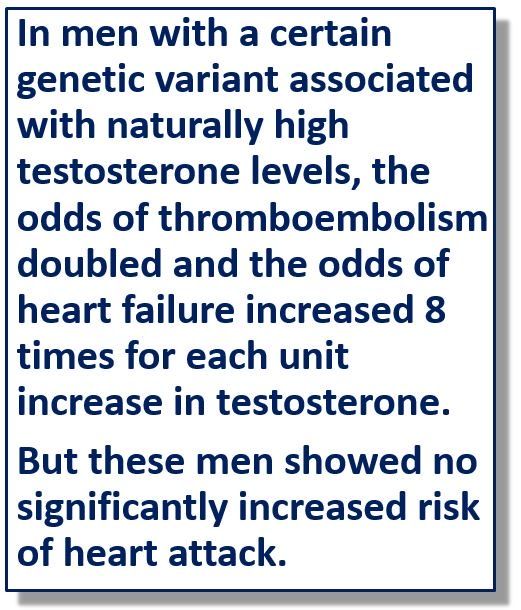Article
High Endogenous Testosterone Ups Risk for Serious CV Events in Men
Author(s):
Results of this study, which examines lifelong endogenous testosterone exposure, add to the body of evidence in support of regulatory warnings about testosterone replacement therapy.

Men with naturally high testosterone levels may be at many-fold greater risk for serious cardiovascular (CV) events, according to findings published recently in the BMJ.1
“[O]ur study suggests that lifelong endogenous testosterone could have a role in thromboembolism, heart failure, and possibly myocardial infarction, particularly among men,” wrote senior author Mary Schooling, PhD of the University of Hong Kong and City University of New York, and colleagues.
The findings support ongoing warnings from the FDA about testosterone supplementation, including requirements that product labeling be revised to address increased risk for heart attack and stroke with testosterone therapy.2
While the study involved individuals with naturally elevated testosterone, the results may have implications for people who take testosterone supplements. Use of testosterone replacement therapy (TRT) has recently sky-rocketed, especially in North America3 where the rise may include prescribing for age-related functional androgen deficiency in older men as well as for men with medical indications for treatment of low testosterone.1 Testosterone is also often used off-label to improve muscle mass and sexual performance.
To investigate a causal link between high testosterone and CV events, researchers analyzed genetic variants associated with naturally high testosterone levels. The analysis included almost 400 000 men and women of European ancestry, with an average age of 57 years. A 2-sample Mendelian randomization design was used in an effort to avoid the confounding frequently seen with observational studies and the limitations of other types of study design used to explore the testosterone-CV event link.1
Analyses were corrected for factors that may affect CV risk, including age, BMI, socioeconomic status, education, smoking, and alcohol.
In men with a certain genetic variant associated with naturally high testosterone levels, the odds of thromboembolism doubled and the odds of heart failure increased 8 times for each unit increase in testosterone. But these men showed no significantly increased risk of heart attack.
When researchers performed a validation test of the results in a separate group of about 170 000 individuals, 77% of whom had European ancestry, genetically high testosterone levels were linked to 37% increased risk of heart attack (OR 1.37).1
Results were less clear in women. But testosterone in women was estimated using genetic variants found in a sample of men only, which could have affected results.
Also, most individuals in the study were of white European ancestry, so results may not generalize to other ethnic groups.
References1. Luo S, Au Yeung SL, Zhao JV, et al. Association of genetically predicted testosterone with thromboembolism, heart failure, and myocardial infarction: mendelian randomisation study in UK Biobank. BMJ. 2019 Mar 6;364:l476. doi: 10.1136/bmj.l476.
2. US Food and Drug Administration. FDA Drug Safety Communication: FDA cautions about using testosterone products for low testosterone due to aging; requires labeling change to inform of possible increased risk of heart attack and stroke with use. Accessed March 20 2019 at:
3. Handelsman DJ. Global trends in testosterone prescribing, 2000-2011: expanding the spectrum of prescription drug misuse. Med J Aust. 2013;21:548-51.





